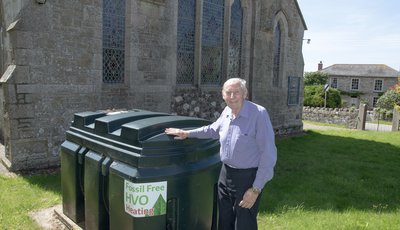Many houses in Kehelland, an off-the-gas-grid village with a primary school and a Methodist Church in the Cornwall and Isles of Scilly Methodist District, have been trialling HVO provided by Mitchell & Webber, a family-run heating oil supplier.
In late 2020 the firm began trialling HVO in residential boilers in Cornwall. ‘As soon as we knew it was working well, we tried it in several different types of boilers, such as condensing and non-condensing, internal and external, and they all worked,’ says John Weedon from Mitchell & Webber. When the village of Kehelland was offered the conversion to HVO in 2022, Kehelland Methodist Church in the Camborne, Redruth and Hayle Circuit immediately embraced the change.
The real breakthrough came in April 2024 when the Parliamentary Select committee from the Energy Department, writing a report on off-gas-grid heating, visited Kehelland to witness first-hand how HVO was working in homes, businesses, the school and the Methodist Church.
They first met with four homeowners then visited the school and the Methodist Church where Andrew Geake, Cornwall & Isles of Scilly Methodist District environment and climate change advocate, displayed how instrumental HVO was in working towards the Methodist target of Net Zero by 2030 and how it had involved minimal conversion costs for the relatively newly installed boiler.
Andrew demonstrated their 46 kW boiler heating controls, highlighting how the system allowed rapid and on demand timed heating for different areas of the church, as needed to satisfy the irregular and sometimes short notice usage of the building. This would be difficult to replicate with the limited electrical supply available or trying to use other technologies like heat pumps.
‘This renewable fuel can do the same job as existing heating oil whilst saving nearly 90% CO2 emissions. So in one easy step, this brings this Church very close to achieving the Net Zero target,’ explains Andrew.
The visit to Kehelland was a resounding success, with one seasoned MP praising it as ‘the best thing the select committee has ever seen."’
So what exactly is HVO and why is it being hailed as a game-changer for rural communities looking to reduce their carbon footprint?
HVO is a renewable diesel fuel made from wastes like used cooking oils. Compared to traditional fossil fuels, HVO boasts some impressive eco-credentials. "The net lifecycle of using this fuel can save anywhere between 88% and 90% of the CO2 compared to using fossil fuel," explains John from the supplier. “Furthermore, it is biodegradable, non-toxic and does not degrade like fossil fuels.”
However, the path to widespread adoption is difficult and battling government regulations and scepticism has been an ongoing challenge. A pivotal moment came in March 2023 when the British government finally allowed duty-free imports of HVO from America, increasing the supply. John says, ‘We have two sources of HVO, one in Europe and one in the US. This is good because it keeps a bit of competition that is reflected in the prices.’
The main downside is that it is still currently more expensive than fossil fuel, mainly because those are fuel duty-free whilst HVO is not. While not over the finish line yet, John is optimistic about HVO's future role in decarbonising rural Britain's heating, ‘We believe we have cross-party support for what we are trying to do and the amendments made in the Energy Bill last September requires the Government to have a consultation on an Obligation to introduce HVO for heating’.
‘It can start tomorrow if government policy accepts the concept and acts on it. The conversion is a minimal cost solution using personnel with existing training,’ adds Andrew. ‘It is extremely environmentally friendly as it enables existing equipment, some parts still with a long-life expectancy, to continue to be used rather than the need to prematurely scrap almost the whole of an existing installation. This avoids the unnecessary creation of waste materials and saves associated building and redecorating costs.’
As communities like Kehelland have shown, embracing innovative renewable fuels like HVO could be the key to achieving a sustainable heating solution, especially for heritage buildings ill-suited for other alternatives. With the evidence mounting, the road ahead for HVO seems brighter than ever before.

